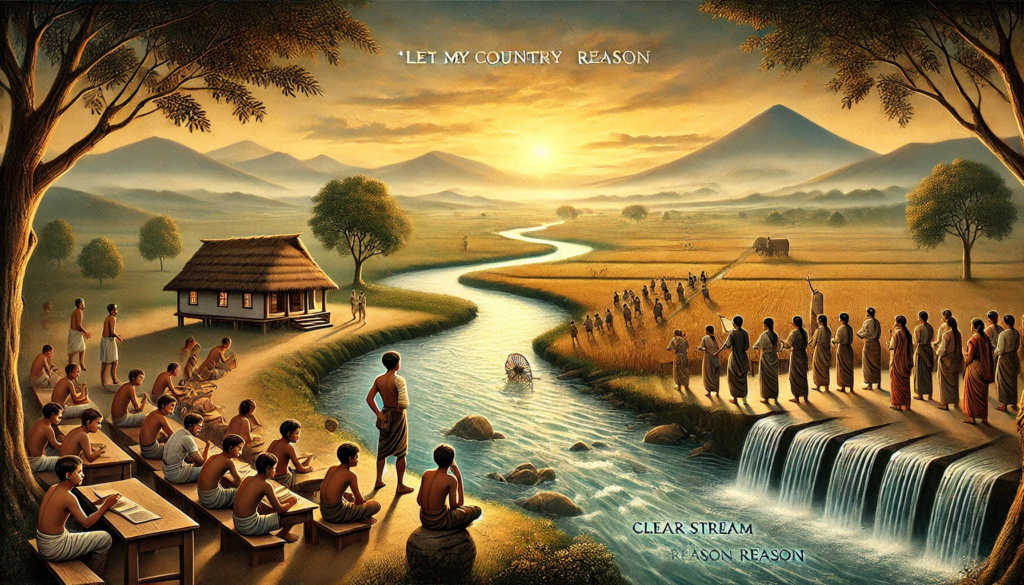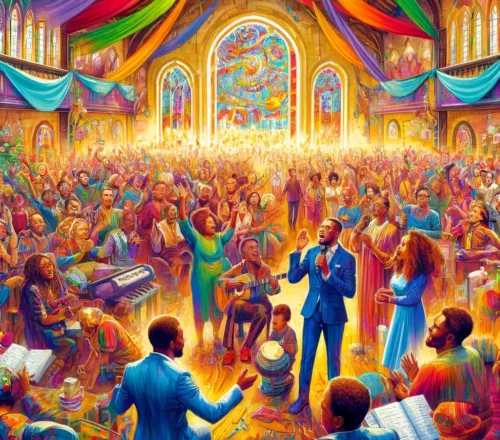
Table of Contents
Let My Country Awake
Where the mind is without fear
Let my country awake, a poem by Rabindranath Tagore, an illustrious Bengali poet, writer, and philosopher. He was not just a literary giant but also a profound thinker whose ideas significantly influenced the socio-political landscape of India. Tagore’s works, including his poetry, songs, and essays, resonated deeply with the spirit of India’s struggle for independence. One of his most famous compositions, “Let My Country Awake,” also known as “Where the mind is without fear,” encapsulates his vision for an enlightened, liberated India.
Tagore’s Vision in his poem “Let My Country Awake”
This poem, originally written in Bengali and included in his acclaimed anthology “Gitanjali” (Song Offerings), was translated into English by Tagore himself. The poem, in its evocative language, outlines a vision of an ideal India, where the mind is free from fear, knowledge is accessible to all, and the world is not fragmented by narrow domestic walls.
Let my country awake
Where the mind is without fear and the head is held high;
Where knowledge is free;
Where the world has not been broken up into fragments by narrow domestic walls;
Where words come out from the depth of truth;
Where tireless striving stretches its arms towards perfection;
Where the clear stream of reason has not lost its way into the dreary desert sand of dead habit;
Where the mind is led forward by thee into ever-widening thought and action—
Into that heaven of freedom, my Father, let my country awake.
The Historical Context and Influence
Tagore’s poem is a clarion call for freedom and rationality, attributes essential for a nation’s self-realization and progress. It reflects his deep concern for a society entangled in colonial oppression and social dogmas. Tagore envisioned an India free from the shackles of British rule, but also from the chains of ignorance, superstition, and social division.
Tagore and the Independence Movement
Although Tagore was not directly involved in the day-to-day politics of the Indian independence movement, his influence was profound. His works inspired many leaders and freedom fighters, including Mahatma Gandhi, with whom he shared a deep, albeit ideologically complex, relationship. Tagore’s emphasis on universal humanism and education played a crucial role in shaping the intellectual underpinnings of the independence movement.
- Education and Enlightenment: Tagore believed that true independence could only be achieved through the enlightenment of the masses. He established Visva-Bharati University in Santiniketan, aiming to create a global center of learning that fostered free-thinking and cultural exchange.
- Critique of Nationalism: Tagore was a critic of extreme nationalism, which he believed could lead to xenophobia and violence. In his essays and lectures, he argued for a form of patriotism that embraced universalism and global harmony.
- Gandhi-Tagore Correspondence: The correspondence between Tagore and Gandhi reflects a dialogue between two great minds, both striving for India’s freedom but with differing approaches. While Gandhi’s methods were rooted in civil disobedience and non-violence, Tagore’s focus was on cultural and intellectual awakening.
Tagore’s Influence on Leaders and Thinkers
- Jawaharlal Nehru: India’s first Prime Minister, Nehru, was deeply influenced by Tagore’s vision of a free and rational India. Nehru’s own speeches and writings often echoed the themes of enlightenment and secularism found in Tagore’s works.
- Satyajit Ray: The celebrated filmmaker Satyajit Ray, who was deeply influenced by Tagore, portrayed many of his themes in his films, emphasizing the importance of reason, education, and cultural heritage.
Sources Leading to India’s Independence
The struggle for India’s independence was a cumulative effort involving numerous leaders, thinkers, and movements. Tagore’s contributions, though more cultural and intellectual, were significant in shaping the ethos of the movement.
- Indian National Congress (INC): Established in 1885, the INC was the principal body leading the political struggle against British rule. Leaders like Bal Gangadhar Tilak, Gopal Krishna Gokhale, and later Gandhi and Nehru, played pivotal roles.
- Non-Cooperation Movement: Led by Gandhi in the early 1920s, this movement aimed at non-violent resistance and mass non-cooperation with the British authorities.
- Civil Disobedience Movement: Initiated in 1930, this movement involved the defiance of British laws, most famously through the Salt March led by Gandhi.
- Quit India Movement: Launched in 1942, this was a decisive movement calling for an end to British rule in India.
- Cultural Renaissance: The Bengal Renaissance, with figures like Raja Ram Mohan Roy, Ishwar Chandra Vidyasagar, and later Tagore, played a crucial role in awakening intellectual and cultural consciousness.
Conclusion
Rabindranath Tagore’s poem “Let My Country Awake” remains a timeless invocation for freedom and rationality. His vision extended beyond mere political independence to encompass a holistic liberation—intellectual, cultural, and spiritual. Tagore’s legacy is a testament to the power of ideas and culture in shaping a nation’s destiny, making him an enduring symbol in India’s long and arduous journey to independence.
Sources
- Tagore, Rabindranath. Gitanjali. Macmillan, 1913.
- Gandhi, Mahatma. The Collected Works of Mahatma Gandhi. Publications Division Government of India.
- Nehru, Jawaharlal. The Discovery of India. The John Day Company, 1946.
- Ray, Satyajit. Our Films, Their Films. Orient BlackSwan, 1976.
- “Indian Independence Movement.” Encyclopedia Britannica, https://www.britannica.com/topic/Indian-independence-movement.
Shop tips
History of india on Amazon
Rabindranath Tagore on Amazon
Thank you for reading, shares and comments!
✨ Comment Policy ✨
We welcome thoughtful, kind, and constructive comments that contribute to meaningful conversations.
Please note:
- Promotional links and unsolicited offers will be removed.
- Spam, irrelevant content, or self-promotion without prior permission will not be published.
- We value quality engagement over quantity — thank you for helping us keep this a respectful and inspiring space!
Take time to learn
Invest in your future
Embark on a journey into the realm of affiliate marketing and craft your own website within a vibrant, supportive community. Join me in this adventure, where you can begin as a free starter and stay as long as you desire. Enjoy complimentary hosting and foundational teachings to set you on your path. For those with advanced skills, opportunities to elevate your expertise await. Take a moment to explore and witness the magic for yourself!




